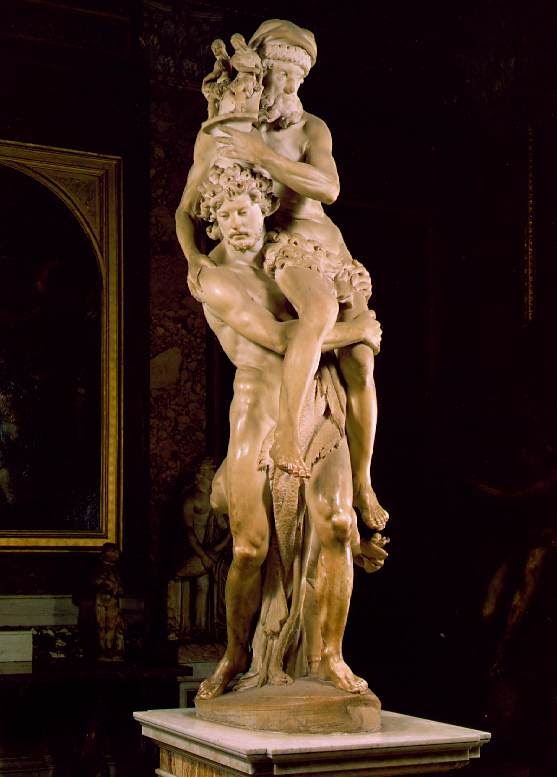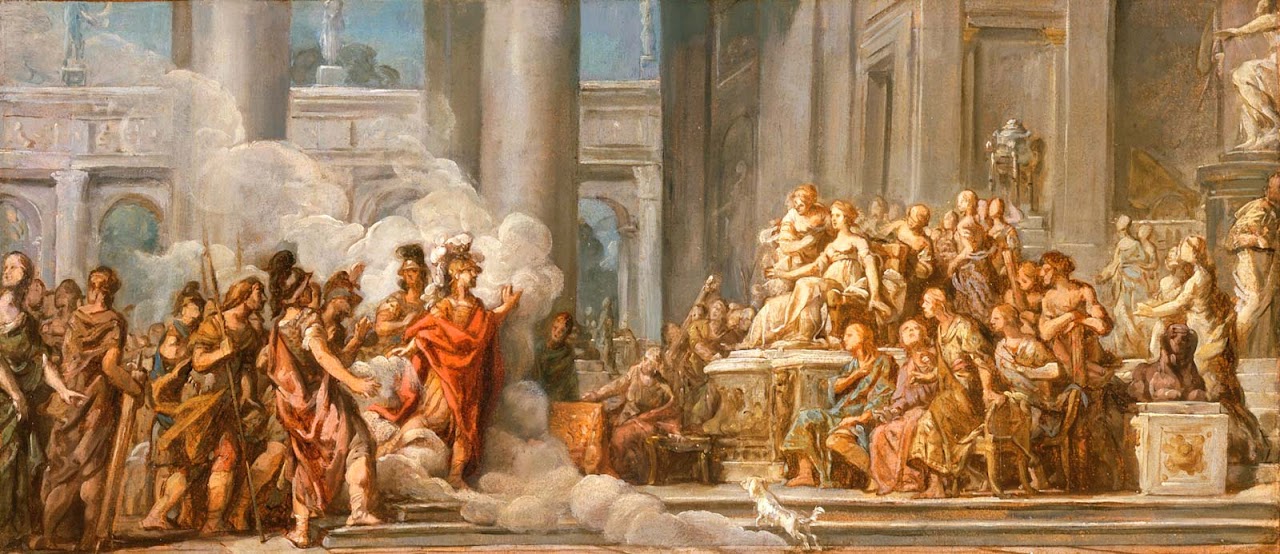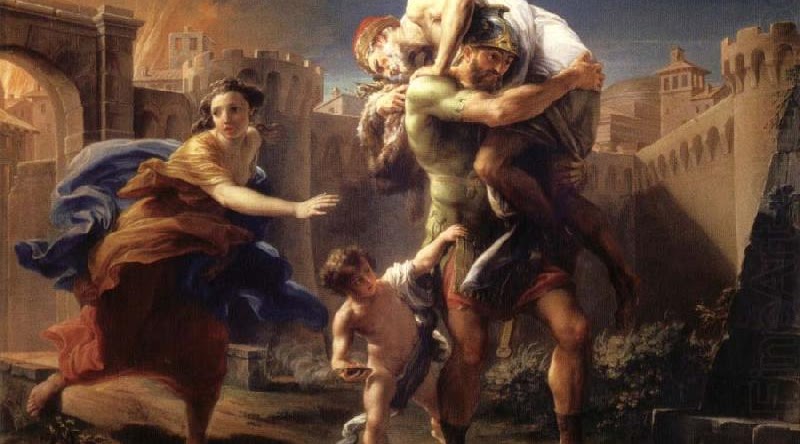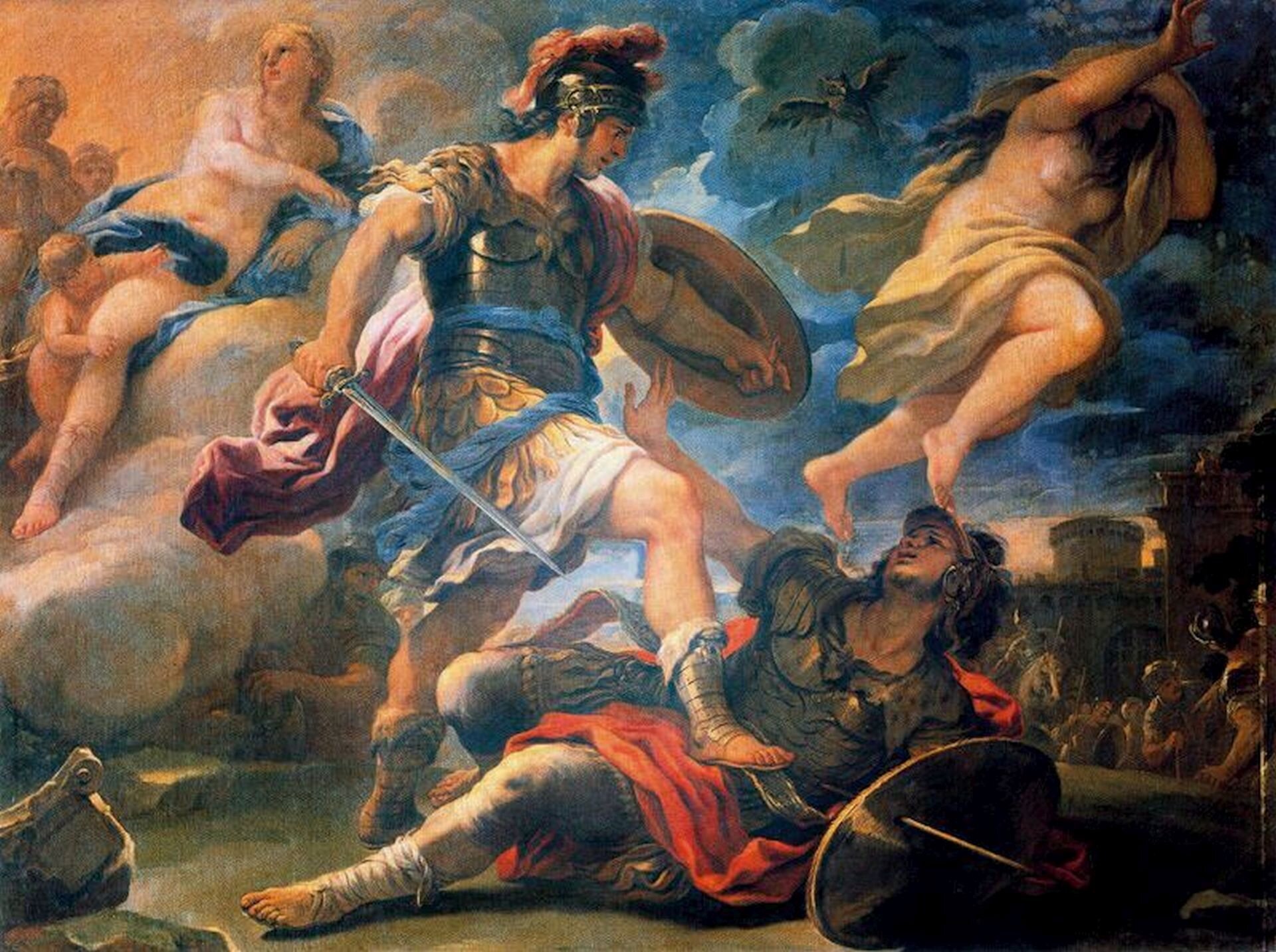Aeneas
Aeneas: The legendary Trojan hero and progenitor of the Roman people, son of Anchises and Aphrodite.

Aeneas was a Trojan hero of Greek mythology, a prince son of mortal Anchises and goddess Aphrodite. In addition, Aeneas was the legendary founder of the Roman race.
Though Troy was in Asia Minor, it was fully influenced by Greece, Greek culture, as it was an old commercial colony of Greeks in the region. So although many of the Trojans were not considered Greeks, they married Greeks, had Greek cus, spoke Greek, worshiped the same gods, even their royal generation was descended from the king of gods, Zeus. Aeneas is said to be the son of the goddess Aphrodite. The main source of Aeneas' stories is Eneada, written by the Roman poet Virgil, but there were many other legends in the Greek world.
Venus did not choose Anchises as a lover. Their union was arranged by Zeus as a punishment because he accused her of using her power on him to fall in love with mortal women. Aphrodite was ashamed of her union. She forbade Anchises to talk about it, but she vowed that their son would become a great hero. After the birth of Aeneas, nymphs took care of him, and brought him up until he grew up enough to become a warrior.

Aeneas matured at the beginning of the Trojan War. There is the opinion that Aeneas as well as other heroes, including Achilles and Odysseus, are transient figures standing at the brink of a change in people's culture. After the Trojan War, the demigods such as Aeneas and Achilles would cease to influence the fate of the nations, and also the world would no longer be "inhabited" by the supernatural monsters and witches Aeneas and Odysseus were facing on their journeys.
When the Achaeans besieged Troy, Aeneas helped defending the city as the leader of a group of Trojan allies called the Dardans. He was one of the most prolific defenders of Troy, although he was forced to flee by the supreme Greek warrior, Achilles, when in more than one cases he escaped death with the intervention of the gods.

Although Aeneas and Priam were on the same side, there was a friction between them. The antipathy between them is due to the suggestion that Aeneas made, that the Trojans should capitulate with the Achaeans. In any case, when the Achaeans invaded Troy, Aeneas, unlike other Trojan warriors, either escaped or was allowed to leave. The hero, taking his elderly father to his shoulders, and his little son Ascanio by hand, led a group of survivors away from the ruined city. But in confusion he lost his wife, Kresa.
The Trojan fugitives wandered for years in search of a new homeland. As during the Trojan War, goddess Aphrodite helped them, while goddess Hera continued the war against the Trojans. During these voyages the Trojans suffered, some died because of the storms and hardships, and failed several times to establish a new city. They met other survivors from Troy, but they could not escape its tragic destiny.
According to the stories, the Trojans initially tried to establish the city of Aenea in Thrace, but they were prevented from doing so by terrifying omens. When they were sailing again they arrived at the island of Delos. There they were advised by the oracle of Apollo, to find their "first Mother". Anchises concluded that he probably meant the island of Crete, the original homeland of the royal generation of the Trojans. When they arrived there, the Trojans attempted to establish a town called Pergamon, as Troy had previously been called. However, when the Trojans were hit by a plague, they realized that this was probably the first homeland of another part of the royal family, originating in Italy.

Traveling to the west, the Trojans stopped on the islands where they encountered the Arpiyes, the frightened female monsters that had fought with Jason and the Argonauts. Continuing their journey, they were found in Aktio, on the west coast of Greece, where they held athletic games in honor of Apollo. The next step of their journey brought them to Bouthroto, northwestern Greece, where they met the oracle lord Elenos, the only living son of Priam. Elenos gave Aeneas important information about the rest of his trip. Sailing for Sicily, the Trojans tricked the Cyclops and avoided Scylla and Charybdis, who had caused problems in Odysseus. At the next stop Drepanos, Anchises died of natural causes. As they sailed to the mainland of Italy, the goddess Hera sent a terrible storm that plunged many Trojan ships, while the rest were drifted to Carthage on the shores of modern Tunisia.
In North Africa, the Trojans were invited to join a colony of the Phoenicians, governed by Queen Dido.Aeneas fell in love with Dido, but the gods reported to him that the fate of the Trojans was not to unite with the Phoenicians, but with the Italians. So Aeneas with great reluctance sailed away. He left in the middle of the night, and when Dido learned it, she swore an eternal struggle between the Carthaginians and the future Romans, and then committed suicide.
The Trojans arrived again in Italy. Returning initially to Sicily, they conducted racing games to honor Anchises. After the games, the Trojans, tired of wandering, set fire on the ships, but Aeneas prayed in Zeus to send rain so that only four boats were burned. Arriving in Kymi (near modern Naples), Aeneas consulted the fortune-teller Sivilla who sent him to the Under World after leading him to bring a golden branch from a sacred forest. In the Under World, Aeneas faced the ghosts of his former rivals and allies, as well as the shadow of his father, who showed him the glorious future of Rome. Guided by Anchises and other divine oes, the Trojans insisted until they found the estuary of the Tiber River.

Though they had reached the promised land, the Trojan suffering was not over. Aeneas tried to make a treaty with the inhabitants of the Tiber region, the Latins, whose King Latino was of Greek descent. Latin initially agreed to an alliance, and promised his daughter Lavinia to Aeneas. However, he had earlier called it to Turnos, prince of the Rutylons, who led by Hera threatened with war. Then Aeneas found an ally, king Evander, of another Greek colony of Arcadians who had settled near the future location of Rome.
The war broke out. On one side, Tournos led an alliance of Latins, Rutyls and Etruscans under the Tyrant Mezentius. Against them was Aeneas with the Trojans and their allies, including the Arcadians of Evander and another group of Etruscans with King Tarchon. Many were killed on both sides, such as the son of Evander Pallas and the two brave brothers Nisos and Euryalus from the Trojans. Mezentios and Camilla, a Latin female warrior, were also killed. During the battles Turnos tried to set fire to the Greek ships. However, Hera, enraged because the ships were made of sacred woods from her forests, pleaded with Zeus, who transformed the ships into water nymphs.
Angry at Pallas' death, Aeneas killed Turno in battle. With their supreme warrior dead the Latin alliance was dissolved and begged for peace. Hera finally accepted the Trojan presence in Tiber. Aeneas married Lavinia, who for some became Jules' mother. Perhaps she was also the mother of Aeneas’ daughter, Ilias. Aeneas reigned a people mixed with the Trojans and Italians and founded a new city called Lavinio, near the future location of Rome, which was later established by the descendants of Aeneas, Rome and Romulus.
Aeneas died just three years after arriving in Italy. Some versions say he was killed in the battle, while others, he just disappeared after his victory. After his death, Aphrodite pleaded with the other gods and made her son immortal, as did other heroes like Hercules.